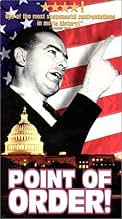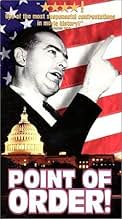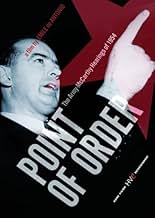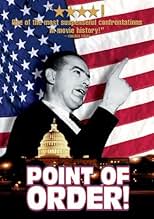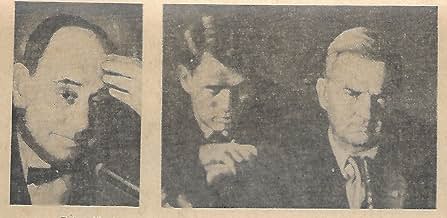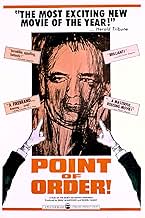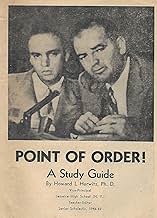An unfiltered, unflinching document of the notorious 1954 Army-McCarthy hearings, compiled entirely from raw TV footage (with no narration, music, or added scenes).An unfiltered, unflinching document of the notorious 1954 Army-McCarthy hearings, compiled entirely from raw TV footage (with no narration, music, or added scenes).An unfiltered, unflinching document of the notorious 1954 Army-McCarthy hearings, compiled entirely from raw TV footage (with no narration, music, or added scenes).
- Awards
- 1 win total
John G. Adams
- Self - U.S. Army counsel
- (archive footage)
Roy M. Cohn
- Self
- (archive footage)
Ray Jenkins
- Self
- (archive footage)
- (as Ray H. Jenkins)
Joseph McCarthy
- Self
- (archive footage)
John L. McClellan
- Self - U.S. Senator, Arkansas
- (archive footage)
Karl E. Mundt
- Self - U.S. Senator, South Dakota
- (archive footage)
G. David Schine
- Self - U.S. Army private
- (archive footage)
Robert T. Stevens
- Self - U.S. Secretary of the Army
- (archive footage)
Stuart Symington
- Self - U.S. Senator, Missouri
- (archive footage)
Joseph N. Welch
- Self
- (archive footage)
Featured reviews
I saw this in 1964 when it was originally released. I waited so long to see it again. Like most good documentaries it focuses on a small theme. The power of this movie comes mainly from its inherent defense against accusations of biased reporting of events, peoples' facial expressions and appearances, words taken out of context and revisionist history. This power was due entirely to the fact that there was no script, no actors, no makeup artists, no retakes and special effects. This movie was cinema veritae. Joe McCarthy, Roy Cohn, Ray Welsch and all the others shown were themselves speaking their thoughts and feelings without varnish.
For those who wondered how Hitler ascended to power, between McCarthy and J. Edgar Hoover, it could have happened here, Those of us who understand this have a special obligation to protect this country for those who don't see, can't see or don't care. Freedom is very vulnerable. The movie demonstrated this.
For those who wondered how Hitler ascended to power, between McCarthy and J. Edgar Hoover, it could have happened here, Those of us who understand this have a special obligation to protect this country for those who don't see, can't see or don't care. Freedom is very vulnerable. The movie demonstrated this.
Apparently the DVD's as of 2012 are expensive to obtain. My used one ran 50 bucks. Anyway, this is a slice of history that riveted the nation in those early days of coast-to-coast TV. Reviewer Mike Rice does a good job of filling in the background, so there's no need to repeat it here.
The documentary is an edited version of the 1954 senate hearings. On the whole, editing is to film footage what the eraser is to penciled composition. In short, astute editing can be used to create many, sometimes incompatible, effects. Now, I have no reason to believe editing was used here to skew any particular effect, but its potential for mischief is well to keep in mind.
Maybe it's my seven decades of breathing, but I did have some trouble following the narrative, and could have used some helpful bridges (a voice-over or graphics) to flesh out better continuity, especially when the topic of the Hearings changes. But whatever the difficulty, the legal fencing between experts is fascinating to watch. Note, for example, how no one on either side responds with a simple yes or no.
Naturally, most viewers approach the material with their own political pre-conceptions. I have mine, still I want to venture several observations not rooted, I believe, in my politics. Firstly, I don't recall seeing clips of McCarthy smiling before; here he at times appears almost affable, contrary to his usual sour image. Secondly, Welch is one eloquent attorney who really knows how to think on his feet. The usual brief clips of "Have you no sense of decency" only hint at those abilities. Then too, he's so unprepossessing looking you don't expect him to dominate the way he sometimes does. Lastly, I'd really like to know who concocted that phony letter from Hoover, along with the cropped photo. I may have missed something, but I don't believe those questions are resolved in the footage.
Be that as it may, Point of Order is real life dramatics at its most fascinating and remains an important slice of post-war history, from which the junior senator from Wisconsin never really recovered.
The documentary is an edited version of the 1954 senate hearings. On the whole, editing is to film footage what the eraser is to penciled composition. In short, astute editing can be used to create many, sometimes incompatible, effects. Now, I have no reason to believe editing was used here to skew any particular effect, but its potential for mischief is well to keep in mind.
Maybe it's my seven decades of breathing, but I did have some trouble following the narrative, and could have used some helpful bridges (a voice-over or graphics) to flesh out better continuity, especially when the topic of the Hearings changes. But whatever the difficulty, the legal fencing between experts is fascinating to watch. Note, for example, how no one on either side responds with a simple yes or no.
Naturally, most viewers approach the material with their own political pre-conceptions. I have mine, still I want to venture several observations not rooted, I believe, in my politics. Firstly, I don't recall seeing clips of McCarthy smiling before; here he at times appears almost affable, contrary to his usual sour image. Secondly, Welch is one eloquent attorney who really knows how to think on his feet. The usual brief clips of "Have you no sense of decency" only hint at those abilities. Then too, he's so unprepossessing looking you don't expect him to dominate the way he sometimes does. Lastly, I'd really like to know who concocted that phony letter from Hoover, along with the cropped photo. I may have missed something, but I don't believe those questions are resolved in the footage.
Be that as it may, Point of Order is real life dramatics at its most fascinating and remains an important slice of post-war history, from which the junior senator from Wisconsin never really recovered.
Without narration, this documentary presents audio-visual excerpts from the famous Army-McCarthy hearings of 1954. The televised hearings were significant in that they brought to light the mean-spirited, and unfounded, accusations of an American demagogue, Wisconsin Senator Joseph McCarthy, a man who claimed that certain individuals, both in the U.S. Army and elsewhere in American government, were Communist spies.
What is glaringly obvious, from this documentary, is that McCarthy had no evidence. He and his chief counsel, Roy Cohn, accused, implicated, vilified, and pointed fingers. And the political climate in the 1950s was such that even these accusations were enough to destroy the careers and lives of many individuals. McCarthy, an ambitious politician, used fear as a weapon, which contributed to unwarranted suspicion during the Cold War.
The hearings are theatrical, Shakespearean drama, in part. Several times, impassioned speeches are made. At other times, the proceedings are laughably petty, like when the committee examines a photograph of Army Private David Schine (pronounced Shine). The subtext during this segment is that David Schine and Roy Cohn had some sort of homosexual relationship, an ironic development, given that Cohn and McCarthy, as political Conservatives, would be just as hostile to homosexuals as to Communists.
One might think that "Point Of Order" would be dry and boring. But the political atmosphere was so charged, so on-edge, that the viewer can easily discern the tension, the fear, and the anxiety of people who had no idea how these events would play out.
McCarthy probably thought these hearings would be a stepping stone en route to the White House. Instead, the camera, as hero, revealed to the American people that McCarthy was a fear monger. Television was his downfall. And the overall message of "Point Of Order" is that enhanced communications technology, in this case television, can be used to thwart the plans of would-be dictators and tyrants.
Today, money has corrupted television. But communications technology continues to evolve, and the internet now functions as a medium that shines lights into dark corners, as television did fifty years ago.
What is glaringly obvious, from this documentary, is that McCarthy had no evidence. He and his chief counsel, Roy Cohn, accused, implicated, vilified, and pointed fingers. And the political climate in the 1950s was such that even these accusations were enough to destroy the careers and lives of many individuals. McCarthy, an ambitious politician, used fear as a weapon, which contributed to unwarranted suspicion during the Cold War.
The hearings are theatrical, Shakespearean drama, in part. Several times, impassioned speeches are made. At other times, the proceedings are laughably petty, like when the committee examines a photograph of Army Private David Schine (pronounced Shine). The subtext during this segment is that David Schine and Roy Cohn had some sort of homosexual relationship, an ironic development, given that Cohn and McCarthy, as political Conservatives, would be just as hostile to homosexuals as to Communists.
One might think that "Point Of Order" would be dry and boring. But the political atmosphere was so charged, so on-edge, that the viewer can easily discern the tension, the fear, and the anxiety of people who had no idea how these events would play out.
McCarthy probably thought these hearings would be a stepping stone en route to the White House. Instead, the camera, as hero, revealed to the American people that McCarthy was a fear monger. Television was his downfall. And the overall message of "Point Of Order" is that enhanced communications technology, in this case television, can be used to thwart the plans of would-be dictators and tyrants.
Today, money has corrupted television. But communications technology continues to evolve, and the internet now functions as a medium that shines lights into dark corners, as television did fifty years ago.
This 1963 film is reminiscent of another hearing we all may be familiar with - can you say Monica?
This documentary is a fascinating ride into the mind of American anti-hero Joseph McCarthy and his rivals in the Senate as he defends his (then closeted gay) staff member from accusations of improprieties in the televised Senate committee hearings.
The amazing thing is McCarthy's stupidity and arrogance in his presentation and his use of red herrings to get back to his "agenda". There are open laughs and applause at moments that show McCarthy's loss of power, culminating in the famous "senator, have you no sense of decency" comment by Mr. Welch.
The style is a bit dated - geez, it was just an assembly of clips - but it tells a story that this writer missed in his civics class. It's a must see for anyone interested in American politics, and it is especially interesting to students of political scandal.
This documentary is a fascinating ride into the mind of American anti-hero Joseph McCarthy and his rivals in the Senate as he defends his (then closeted gay) staff member from accusations of improprieties in the televised Senate committee hearings.
The amazing thing is McCarthy's stupidity and arrogance in his presentation and his use of red herrings to get back to his "agenda". There are open laughs and applause at moments that show McCarthy's loss of power, culminating in the famous "senator, have you no sense of decency" comment by Mr. Welch.
The style is a bit dated - geez, it was just an assembly of clips - but it tells a story that this writer missed in his civics class. It's a must see for anyone interested in American politics, and it is especially interesting to students of political scandal.
Roy Cohn keeps popping up in American culture, from his fictionalized roles in "ANGELS IN America"-- as interpreted by Al Pacino (actor), Tony Kushner (playwrite), and Mike Nichols (director) --and Kurt Vonnegut's "JAILBIRD," to his actual deeds as documented by the likes of Emile de Antonio here in "POINT OF ORDER." Although there have been some attempts to put Cohn in perspective-- Frank Pierson's awful HBO film, "CITIZEN COHN," comes to mind (with James Woods' cartoon performance), I believe we've yet to see anything approaching a definitive look at him and his legacy.
As for McCarthy and McCarthyism, "POINT OF ORDER" stands as an excellent non-fiction introduction to the beginning of their ends. It's great drama, and it's full of truth. And that is all. "POINT OF ORDER" is where one can start, yet not where one may find real answers.
As for McCarthy and McCarthyism, "POINT OF ORDER" stands as an excellent non-fiction introduction to the beginning of their ends. It's great drama, and it's full of truth. And that is all. "POINT OF ORDER" is where one can start, yet not where one may find real answers.
Did you know
- TriviaIncluded in The New Republic's list of "The 100 Most Important Political Films of All Time."
- ConnectionsFeatured in McCarthy: Death of a Witch Hunter (1975)
Details
- Release date
- Country of origin
- Language
- Also known as
- Herr ordförande! En ordningsfråga
- Production company
- See more company credits at IMDbPro
- Runtime
- 1h 37m(97 min)
- Color
- Sound mix
- Aspect ratio
- 1.37 : 1
Contribute to this page
Suggest an edit or add missing content

